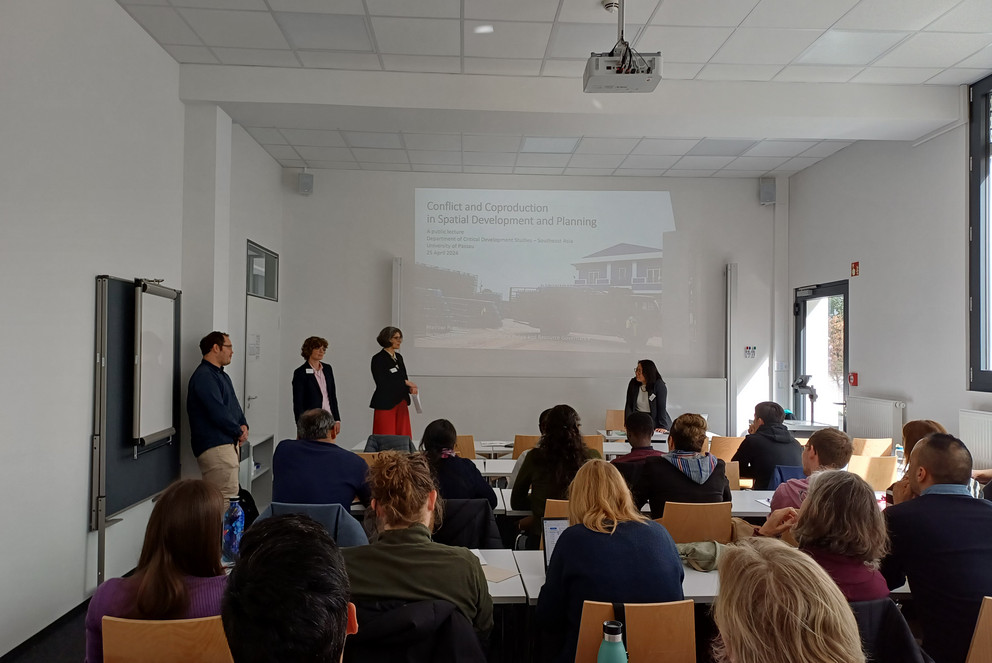Press & Blogs
Institutions of sustainability
21 years of network meetings in Germany

For more than 20 years, the NIÖ network has been debating the latest perspectives on institutions of environmental coordination in an informal, yet continous framework. Inspired by classical and heterodox, game-theoretical and other research approaches to institutions, scholars from all over Germany met at the University of Passau on April 25 and 26, 2024. Professor Martina Padmanabhan invited to the Chair of Critical Development Studies - Southeast Asia to analyse the latest developments in research and organization of common goods and the commons, such as water, food and climate. Influences from environmental economics, political ecology and polycentricity underline the diversity of intellectual approaches within the network. The collective and individual development of institutional analysis is exemplified by polycentric approaches, among others, examining the coordination of local bodies of knowledge in networks.
NIÖ welcomed a large delegation of scientists from the German Institute of Development and Sustainability (IDOS) in Bonn. Amongst other things, they outlined the breadth of research on the water-energy-food ecosystem nexus (WEFE Nexus) and the associated challenge of identifying conflicting policies. Nina Hagemann and Stephan Bartke from the Environmental Agency (Umweltbundesamt) in Dessau showed concrete steps on how a knowledge-based organization approaches sustainable transformation in national and international cooperation.
The workshop offered the opportunity to network within the University of Passau and to exchange ideas with the Bioeconomy research group headed by Dr. Therese Venus and the Chair of Economics and Economic Theory. Latter Chair holder, Johan Graf Lambsdorff, wondered whether he should cut down a ginkgo tree in his garden, thus sparking a lively discussion about the legal personhood of non-human beings and who to appropriately organize around their interests.
As part of the Research Colloquium Passau, junior research group leader Dr. Prathiwi Putri from the University of Kassel, Chair of International Agricultural Policy and Environmental Management, gave a lively insight into conflicts and knowledge co-production in spatial planning using the example of official and informal water infrastructure in Jakarta. She invoked the metaphor of dance, which captured the physicality and mobility of the fluid medium and corresponding forms of organization.
The NIÖ network is planning a workshop at the Humboldt University Berlin, Chair of Resource Economics, in honor of its Spiritus Rector Professor Konrad Hagedorn.
Inside Indonesia
Natural farming in Yogyakarta

‘We need to counter the image of farming as an unattractive occupation with bleak prospects for young people. If not us, then there is no future for Indonesian agriculture,’ declares Gus Qomar, co-founder of Sekolah Tani Muda (Young Farmers School), or Sekti Muda for short.
IIAS ASIA NEWS
Between ‘green lies’ in Germany and organic agriculture in Indonesia
Germany and other countries of the Global North import a variety of organic products from Indonesia, such as organic rice, coffee and coconut sugar. The Indonesian National Standard was formulated by the Indonesian government to ensure the quality standard of organic produce in order to protect consumers and producers. However, certification is negatively perceived by some Indonesians as simply privileging large-scale profitable projects, thereby ignoring issues such as food security and environmental integrity; and farmers who are certified face numerous challenges once they are integrated into the global market.
Blog Post by Undisciplined Environments
Environment and Sustainability in the globalised classroom

A students’ review of Andrea Nightingale’s book “Environment and sustainability in a globalizing world”.

